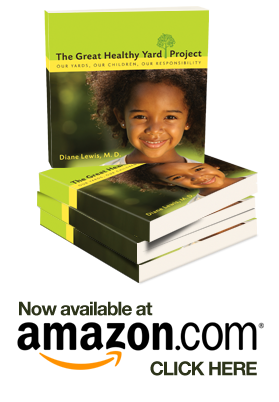We all want our children outside this spring and summer to stretch their legs and lift their hearts. Investigating nature first hand by finding frogs and dragonflies, looking at birds, and smelling flowers, powers our children’s imagination. And most of us have our first brush with science watching a Monarch Butterfly emerge from a cocoon, tadpoles grow into frogs, or seeds that we planted grow into food.
But bites from ticks and mosquitoes can be more than an itchy nuisance. Tick bites can spread many diseases including Lyme disease, and mosquitoes can harbor West Nile and other viruses. Pesticides are designed to kill bugs, but we now know that they can hurt people in surprisingly small amounts, especially children. They can interfere with the hormones that regulate everything from neurologic development to growth and metabolism, and everything else in our bodies, too.
So here are some tips to keep those bugs off your children, without using stuff that can hurt them.
1. Make your yard unattractive to ticks. Mulch leaves into the lawn or compost them. This is a two-fold whammy to the ticks. They dry out and die on mowed grass without the leaves to shelter them, and mice that carry ticks won’t have leaves to burrow under, so they will go elsewhere. Don’t spray your yard for ticks. An ongoing CDC study shows it does decrease tick numbers somewhat, but doesn’t decrease Lyme disease.
2. Mosquitoes breed in water. Don’t leave buckets, kiddie pools or other standing water around. If you have a pond add fish to it (our County gives fish away to encourage homeowners to do this). Add Bti, bacillus thuringiensis israelensis, to ponds and streams. This is a naturally occurring bacteria that produces a toxin that kills blackfly and mosquito larvae, but is otherwise harmless. It is available at garden stores in small discs.
3. Grow lots of plants that are natural to your area. This will attract dragonflies, birds, and bats that control pesky insects naturally. One dragonfly can eat up to 1,000 mosquitoes a day! Don’t kill the good bugs and birds with pesticides. Also, plant herbs like lemon balm, catnip, or rosemary near where you plan to sit outside, they will keep bugs away.
4. Don’t go where and when the bugs are worst! Avoid dawn and dusk, tall grass and brush, and swampy areas. If you have to, cover up.
5. Citronella is an effective herbal repellant, but needs to be applied every two hours. DEET is effective and lasts five hours. But, DEET meddles with nerve transmission in causing fireflies to light up, and people’s lips to go numb. There is evidence it may also muck with hormones, too. So use it only when you really need it, and on top of clothing. Do a thorough tick check when you come in, and wash and dry your clothing. Washing gets the repellant off, and drying kills the ticks and bugs.
If they are welcome in your neighborhood, consider keeping chickens, too. They eat a lot of bugs, and give you fresh eggs every morning!

